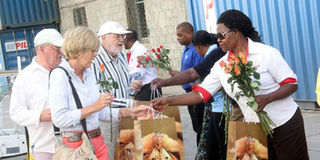Malindi desperately needs investment and improved infrastructure to grow

Kenya Tourism Board officials welcome tourists upon their arrival at the port of Mombasa on December 23, 2015. The return of tourists has had little impact on the infrastructure and other investments in Malindi town. PHOTO | LABAN WALLOGA | NATION MEDIA GROUP
What you need to know:
- The Malindi District Hospital is overstretched and the quality of public education is so appalling that many children here never make it to secondary school.
- It often feels like an Italian colony. This “Little Italy” is highly dependent on these Italian residents and tourists, who bring with them much-needed jobs.
- In 2012, the Law Society of Kenya told a local newspaper that it had evidence that a “club of impunity” involving locals and foreigners existed in Malindi.
Foreign and local tourists started to trickle back to Malindi during the last Christmas holiday season, thanks to the lifting of travel advisories and the return of the high tourism season at Kenya’s coast.
This is good news for the local economy, which relies on tourism.
However, the return of tourists to this beach resort has had little impact on the infrastructure and other investments in what could be one of the most attractive resorts in the country, if not the world.
The centre of Malindi town, which could be a fun place to hang out or shop, is one of the most dangerous places to be in the area as pedestrians have to dodge huge trailers and trucks plying the Lamu-Mombasa route and tuk tuks, boda bodas, and cyclists, all of whom compete for space on a very badly constructed, narrow, pot-holed road that has no pavements.
No one thought of building bumps to slow down the heavy traffic that hurtles down the town centre, often at 100 kilometres an hour.
The promised bypass to Mombasa that would have diverted heavy traffic from Malindi has yet to be built.
Devolution promised a lot but those promises have fallen short here.
The quality of health and education still leaves a lot to be desired.
HAPLESS PEOPLE
The Malindi District Hospital is overstretched and the quality of public education is so appalling that many children here never make it to secondary school.
(A recent survey found that less than one-third of Kilifi county’s adult population has attended secondary school.)
The poverty levels in Malindi and its environs are among the highest in the country, which is why many children drop out of school, thanks to the so-called “free primary education”, which is not free at all.
This is because if a school charges, say Sh2,000 per child in levies and other “fees”, a parent with three children who earns an income of Sh6,000 a month will not send his or her children to school because the cost is one-third of his or her income.
Those who do manage to get a university education never come back to this town, so there are few role models in the local community to inspire the local people to attain higher education.
Furthermore, the emphasis on tourism has created a mindset among area residents that makes them believe that all they can aspire to be is service providers (cooks, cleaners, prostitutes, and the like).
On any given day in many of the cafes in this town, you will find aging foreigners, both male and female, accompanied by local “girlfriends” and “boyfriends”.
Recently a child protection officer in Malindi told the BBC that sex with minors and child prostitution are rampant here but nothing can be done because the clients buy off the police and the courts.
'LITTLE ITALY'
Malindi is a unique historic and multicultural town that hosts a sizeable Italian population and also attracts large numbers of Italian and other foreign tourists.
Many signs in the town are in Italian.
Almost everybody, from the boda boda driver to the fisherman, speaks Italian.
It often feels like an Italian colony. This “Little Italy” is highly dependent on these Italian residents and tourists, who bring with them much-needed jobs.
However, apart from investing in hotels and restaurants, the Italian community in Malindi has not made a significant effort to invest in improving the quality of life of the local population.
It has not built schools, factories, stadiums or public parks.
One of the reasons nothing changes in Malindi, say some residents, is because everyone, including politicians and the police, is in the pockets of resident criminal elements.
It is widely rumoured that wanted foreign fugitives and fraudsters have set up base here and use the Kenyan coastal town as a hideout.
In 2012, the Law Society of Kenya told a local newspaper that it had evidence that a “club of impunity” involving locals and foreigners existed in Malindi.
A residents’ group has been formed to lobby the county government to do more for Malindi residents.
However, its efforts will come to nought if the insidious “code of silence” surrounding child sex tourism, criminality and politicians’ and security services’ complicity are not confronted head-on.





